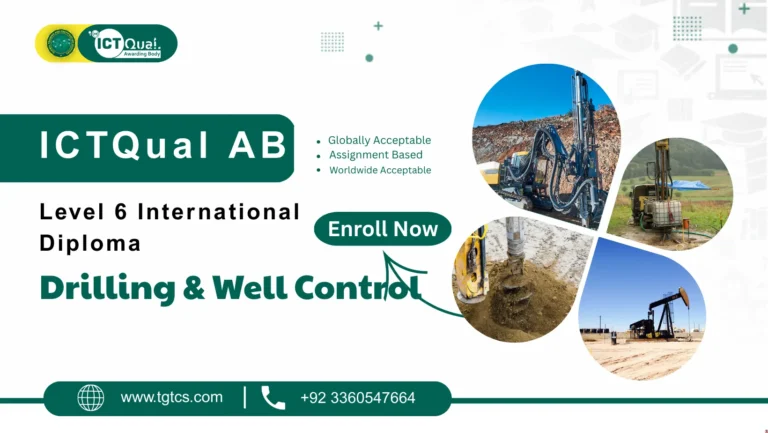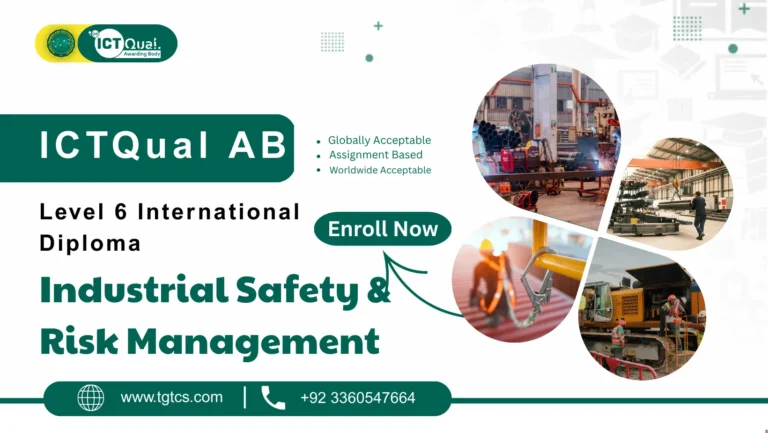ICTQual Level 4 Diploma in Agriculture Engineering 120 Credits – One Year
The ICTQual Level 4 Diploma in Agriculture Engineering is a comprehensive, industry-recognized qualification designed for individuals passionate about combining technology with agriculture. This one-year, 120-credit course equips learners with the essential skills and knowledge to thrive in the rapidly evolving agriculture sector, where modern engineering plays a pivotal role in ensuring sustainable farming practices and enhancing productivity.
The ICTQual Level 4 Diploma in Agriculture Engineering is designed to provide in-depth knowledge and practical skills in agricultural machinery, systems, and technology. Over the course of one year, learners will gain a solid understanding of the principles of engineering as applied to agriculture, including sustainable farming techniques, precision farming technologies, and the use of automation in agricultural machinery.
Agricultural engineering combines the principles of engineering with the science of agriculture, focusing on solving problems related to food production, sustainability, and environmental conservation. As the global population grows, there is increasing pressure to produce more food with fewer resources. Agricultural engineers are key to innovating technologies that can optimize farming practices and improve food security for future generations.
The ICTQual Level 4 Diploma in Agriculture Engineering is an excellent choice for individuals passionate about agriculture, technology, and sustainability. Whether you’re entering the field for the first time or looking to enhance your existing career, this qualification provides the knowledge and skills necessary to succeed in the evolving agriculture sector.
The Global Training and Certification Services (TGTCS) is Directly Approved Training Centre of ICTQual
The ICTQual Level 4 Diploma in Agriculture Engineering is a one-year, 120-credit qualification designed to equip learners with the essential skills and knowledge needed for a career in agricultural engineering. This course covers key areas such as the design, maintenance, and optimization of agricultural machinery, sustainable farming practices, precision farming technologies, and automation systems in agriculture. Learners will gain practical, hands-on experience with modern agricultural equipment and systems, preparing them to address challenges in the evolving agricultural sector.
The course is ideal for individuals seeking to advance their careers or transition into agricultural engineering, with a focus on sustainability and technological innovation. Upon completion, graduates can pursue roles such as agricultural engineer, farm machinery technician, precision farming specialist, and more, with opportunities for further education and career advancement in the field.
Mandatory Units
The Units of Level 4 Diploma in Agriculture Engineering 120 Credits – One Year are as ;
- Introduction to Agricultural Engineering
- Engineering Principles for Agriculture
- Farm Machinery Design and Operation
- Soil and Water Management
- Agricultural Irrigation Systems
- Agricultural Structures and Buildings
- Automation in Agricultural Engineering
- Renewable Energy in Agriculture
- Agricultural Waste Management
- Health, Safety, and Environmental Management in Agriculture
- Agricultural Equipment Maintenance and Repair
- Project Management in Agricultural Engineering
Here are the learning outcomes for each study unit in the ICTQual Level 4 Diploma in Agriculture Engineering program:
- Introduction to Agricultural Engineering
- Understand the role of agricultural engineering in modern farming practices.
- Recognize the evolution of agricultural machinery and tools, along with key technological advancements.
- Explain how engineering contributes to enhancing farm productivity and sustainability.
- Engineering Principles for Agriculture
- Apply core engineering principles such as mechanics and thermodynamics to agricultural systems.
- Analyze and solve practical challenges related to machinery and equipment design in agriculture.
- Understand the fundamental physics laws that govern agricultural processes.
- Farm Machinery Design and Operation
- Identify and describe various types of farm machinery and their functions.
- Understand the key design considerations for agricultural machinery.
- Evaluate operational techniques and efficiency of farm machinery to optimize performance.
- Soil and Water Management
- Comprehend the principles of soil health and its critical role in sustainable agriculture.
- Develop strategies for efficient water usage in farming practices.
- Implement best practices in soil and water management to enhance crop yield and minimize environmental impact.
- Agricultural Irrigation Systems
- Design and evaluate different irrigation systems tailored to various agricultural productions.
- Assess water distribution methods and their influence on crop growth.
- Troubleshoot and optimize irrigation systems for maximum water efficiency and agricultural productivity.
- Agricultural Structures and Buildings
- Identify design elements and construction techniques for agricultural buildings and structures.
- Assess the structural needs of agricultural facilities, including storage, livestock housing, and machinery storage.
- Understand the materials and methods used in constructing durable agricultural infrastructure.
- Automation in Agricultural Engineering
- Grasp the role of automation and robotics in enhancing farming efficiency and productivity.
- Evaluate the application of smart technologies such as drones, sensors, and AI in agriculture.
- Implement automated systems for tasks like crop monitoring, harvesting, and data collection.
- Renewable Energy in Agriculture
- Identify suitable renewable energy sources for agricultural operations, such as solar, wind, and bioenergy.
- Design and implement renewable energy solutions to reduce environmental impact and operational costs.
- Evaluate the potential of integrating renewable energy technologies into modern agricultural systems.
- Agricultural Waste Management
- Apply sustainable methods for managing agricultural waste, both organic and inorganic.
- Develop effective waste management practices to reduce environmental impact and support recycling initiatives.
- Implement strategies for composting, waste-to-energy systems, and safe disposal of agricultural by-products.
- Health, Safety, and Environmental Management in Agriculture
- Understand and apply health and safety regulations related to agricultural engineering.
- Conduct risk assessments to identify and mitigate potential hazards in agricultural work environments.
- Develop environmental management plans to promote sustainable and safe farming practices.
- Agricultural Equipment Maintenance and Repair
- Perform regular maintenance and troubleshooting of agricultural machinery and equipment.
- Apply preventive maintenance practices to reduce downtime and extend the lifespan of farm machinery.
- Diagnose and repair faults in agricultural equipment, ensuring consistent operational reliability.
- Project Management in Agricultural Engineering
- Apply project management principles to plan, execute, and oversee agricultural engineering projects.
- Develop project schedules, budgets, and resource plans for agricultural engineering initiatives.
- Monitor project progress, manage risks, and ensure the successful completion of agricultural engineering projects.
The ICTQual Level 4 Diploma in Agricultural Engineering offers numerous benefits for those looking to pursue a career in the agricultural engineering field or advance their knowledge and skills. Here are some key benefits of this course:
- Comprehensive Knowledge in Agricultural Engineering
Gain a deep understanding of essential topics like farm machinery design, soil and water management, irrigation systems, renewable energy integration, and automation in agriculture. This broad-based knowledge prepares you to address the modern challenges of agricultural production systems. - Hands-on Practical Skills
The course emphasizes practical application, allowing learners to gain real-world experience in maintaining, repairing, and optimizing agricultural equipment. You’ll be equipped with the skills to implement best practices in farm machinery and automation technologies. - Focus on Sustainability and Innovation
With a growing focus on sustainable farming practices, this diploma covers topics like renewable energy in agriculture, waste management, and environmental management, providing learners with the tools to work towards a more sustainable future in agriculture. - Advanced Technological Exposure
Learn to design and implement advanced agricultural technologies, including automated systems, precision farming tools, and smart technologies like drones, sensors, and AI, giving you a competitive edge in the evolving agricultural industry. - Diverse Career Opportunities
Upon completion, graduates are well-prepared for a variety of roles in the agricultural engineering sector. Opportunities include farm machinery technician, agricultural equipment maintenance engineer, irrigation systems designer, and renewable energy specialist in agriculture. - Professional Development and Industry Recognition
Completing the diploma gives you a recognized qualification that enhances your employability and opens up opportunities for career progression in the agricultural and engineering sectors. You’ll also be prepared for further studies at higher qualification levels in agricultural engineering or related fields. - Increased Earning Potential
With specialized knowledge in agricultural engineering, graduates are in high demand, allowing for higher salary prospects in fields such as farm equipment engineering, irrigation design, renewable energy in agriculture, and project management. - Industry-Relevant Skills
The course is designed to provide learners with the most current industry practices and emerging trends, ensuring that you’re equipped with skills that align with the latest needs of the agricultural engineering field. - Global Opportunities
Agricultural engineering is a growing sector globally, and the skills learned in this diploma program can be applied across various geographical regions, offering career opportunities both locally and internationally. - Contribution to Global Sustainability Goals
By learning to design and implement sustainable agricultural practices, this course allows you to contribute to global efforts aimed at improving food security, reducing environmental impact, and promoting sustainable farming practices.
Overall, the ICTQual Level 4 Diploma in Agricultural Engineering provides a solid foundation in agricultural engineering principles, equips you with valuable practical skills, and offers diverse career opportunities in a rapidly evolving and increasingly vital sector.
The ideal learner for the ICTQual Level 4 Diploma in Agricultural Engineering is someone who is passionate about both agriculture and engineering, and is eager to apply technical knowledge to solve real-world problems in the farming sector. Key characteristics of the ideal learner include:
- Interest in Agriculture and Engineering
The ideal learner has a strong interest in agricultural practices and is curious about how engineering can improve farming systems. They are motivated by the potential to drive innovation and sustainability in the agricultural sector. - Hands-on and Practical
This learner enjoys working with their hands and applying theoretical knowledge to practical, real-world situations. They may have some experience with farm machinery, equipment maintenance, or agricultural operations, and are eager to develop specialized skills in these areas. - Problem-Solver
The ideal learner is someone who enjoys identifying challenges and developing practical solutions. Whether it’s designing efficient farm machinery or improving irrigation systems, they are driven to find innovative ways to solve complex issues in agricultural engineering. - Focus on Sustainability
Given the growing importance of sustainability in agriculture, the ideal learner is interested in how renewable energy, waste management, and sustainable farming practices can be integrated into agricultural systems to create long-term, environmentally-friendly solutions. - Technologically Savvy
The learner is comfortable with technology and excited by the possibilities of automation and smart farming tools such as drones, sensors, and AI. They are eager to explore how emerging technologies can be applied to modernize agriculture and increase productivity. - Aspiring Career in Agricultural Engineering
This learner aims to build a career in agricultural engineering or related fields. They may be looking to gain specialized knowledge in farm machinery, irrigation systems, or renewable energy solutions to advance in their current role or start a new career in the agricultural engineering sector. - Self-Motivated and Committed
The ideal learner is dedicated and proactive in their studies, demonstrating a willingness to learn and apply new concepts. They are also able to work independently, manage their time effectively, and tackle complex engineering challenges with a strong sense of responsibility. - Desire to Contribute to Global Challenges
They are motivated by the opportunity to contribute to the resolution of global challenges such as food security, environmental sustainability, and the efficient use of resources in agriculture. They understand that agricultural engineering plays a critical role in addressing these issues. - Academic Background
While a background in agriculture or engineering is advantageous, the ideal learner may also come from a broader STEM (science, technology, engineering, and mathematics) background, with a strong foundation in mathematics, physics, or general engineering principles.
Overall, the ideal learner for this course is someone who is passionate about transforming the agricultural industry through engineering innovation, is eager to acquire practical skills, and is motivated to make a meaningful impact on sustainability and productivity in the farming sector.
Progression Routes
The ICTQual Level 4 Diploma in Agricultural Engineering offers numerous opportunities for further education, career progression, and specialization within both the agricultural and engineering sectors. Upon successful completion of this one-year program, students can follow various pathways to expand their expertise and improve their career prospects. Here are some potential progression options:
1. Higher Education (Degree Programs)
Graduates of the ICTQual Level 4 Diploma can pursue a Bachelor’s Degree in Agricultural Engineering, Mechanical Engineering, or related fields. Many universities offer credit for prior learning, allowing students to advance in their studies. Possible degree options include:
- BSc in Agricultural Engineering
- BEng in Agricultural and Environmental Engineering
- BSc in Sustainable Agriculture and Technology
These degrees provide in-depth knowledge in specialized areas such as advanced machinery design, farm management, and agricultural systems.
2. Specialized Agricultural Engineering Qualifications
Following the Level 4 diploma, students may opt for specialized qualifications in areas like irrigation technology, renewable energy in agriculture, or farm machinery maintenance. These certifications can be obtained through short courses or industry-specific programs, such as:
- Certificate in Agricultural Machinery Maintenance
- Diploma in Irrigation System Design and Management
- Certification in Renewable Energy for Agriculture
3. Professional Certifications and Memberships
Graduates may choose to pursue professional qualifications, including becoming Chartered Engineers or joining professional bodies such as the Institute of Agricultural Engineers (IAgrE) or the Engineering Council. These memberships offer networking opportunities, resources, and continued professional development, improving employability and career advancement prospects.
4. Career Advancement in Agricultural Engineering
With the skills gained through this diploma, graduates can move into senior roles within the agricultural engineering industry, including:
- Senior Agricultural Engineer
- Farm Machinery Specialist
- Agricultural Equipment Maintenance Manager
- Agricultural Systems Analyst
- Project Manager for Agricultural Engineering Projects
The diploma prepares graduates for managerial or technical positions in agricultural machinery companies, large farms, or agricultural consultancy firms.
5. Research and Development in Agriculture
Graduates interested in innovation and new technologies can pursue roles in research and development (R&D) within agricultural technology companies, universities, or government research agencies. These positions involve developing solutions such as new machinery designs, sustainable farming technologies, or automation systems. Graduates may also consider pursuing a Master’s Degree in a specialized area of agricultural research or engineering.
6. Entrepreneurship in Agricultural Engineering
With the technical skills gained, graduates may choose to start their own business or consultancy in the agricultural engineering sector. Potential entrepreneurial ventures include:
- Agricultural Equipment Design and Manufacturing
- Irrigation System Installation and Maintenance
- Consulting on Sustainable Farming Practices and Machinery Optimization
7. International Opportunities
Agricultural engineering is a critical component of global food production, and the skills acquired through this diploma are in demand worldwide. Graduates can explore career opportunities in countries with both advanced farming practices and emerging agricultural industries, taking their expertise internationally.
By completing the ICTQual Level 4 Diploma in Agricultural Engineering, graduates position themselves for diverse career opportunities, further education, and the chance to contribute to sustainable agricultural practices on a global scale.
Course Overview
Course Level
Level 4
Course Units
12 Mandatory Units
Duration
one year






